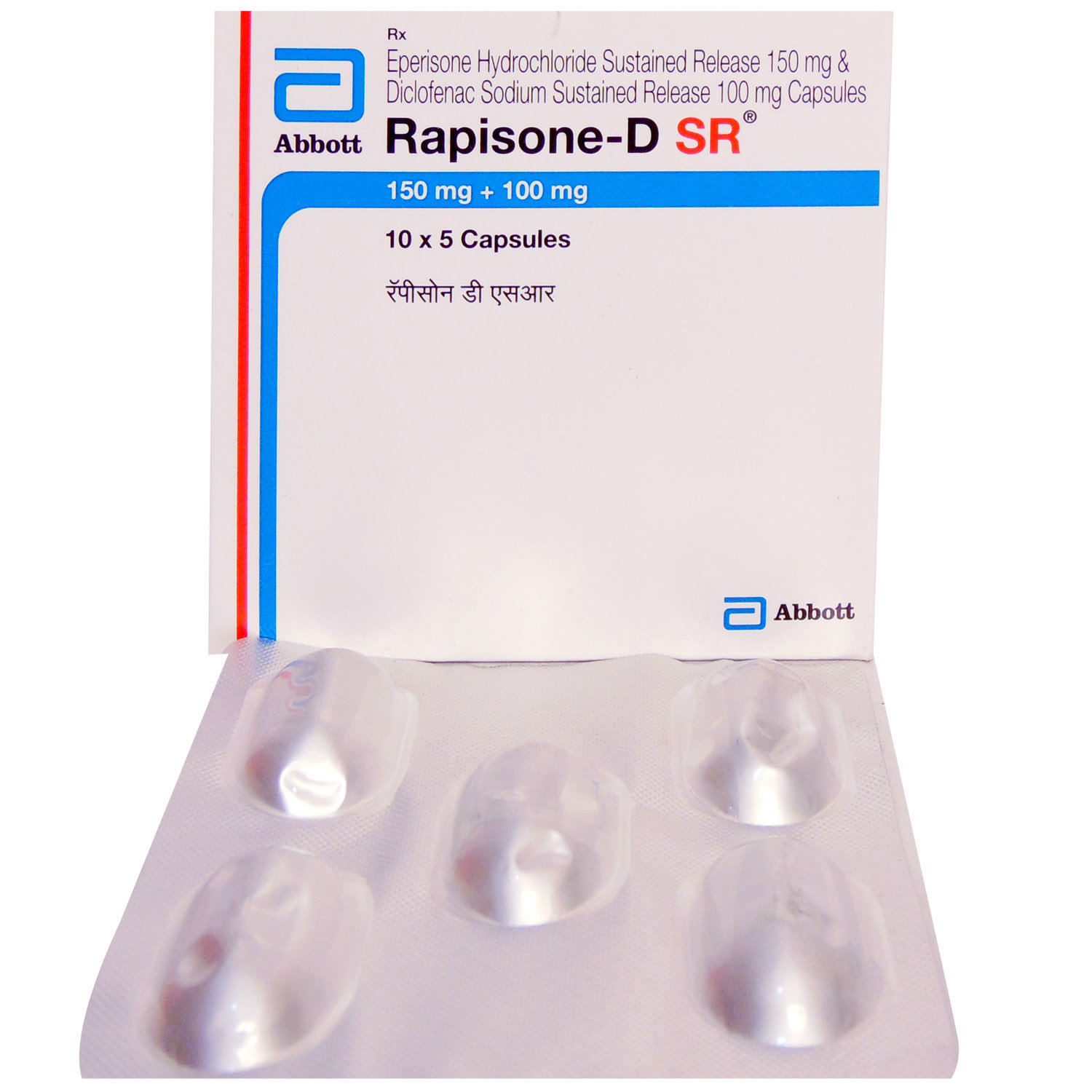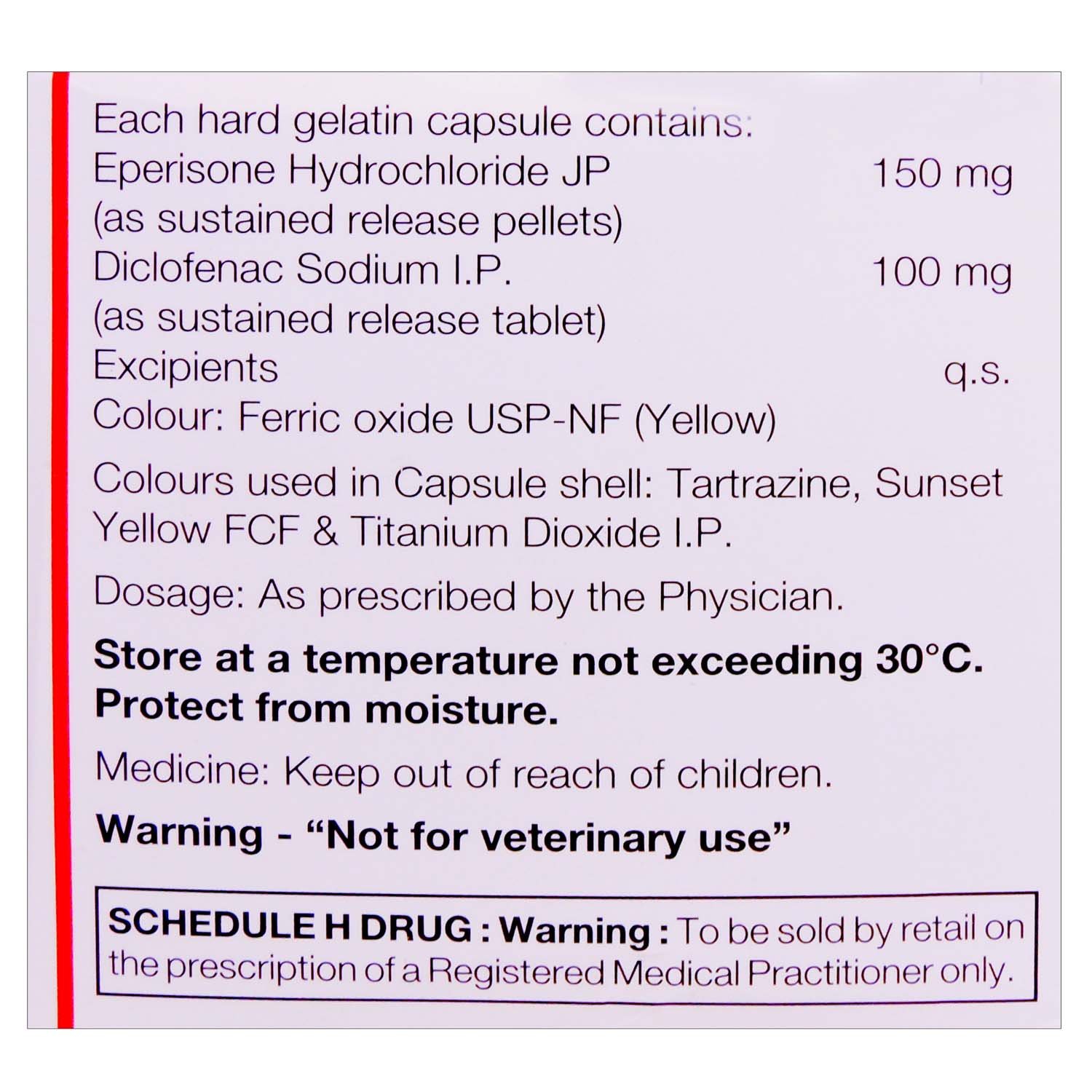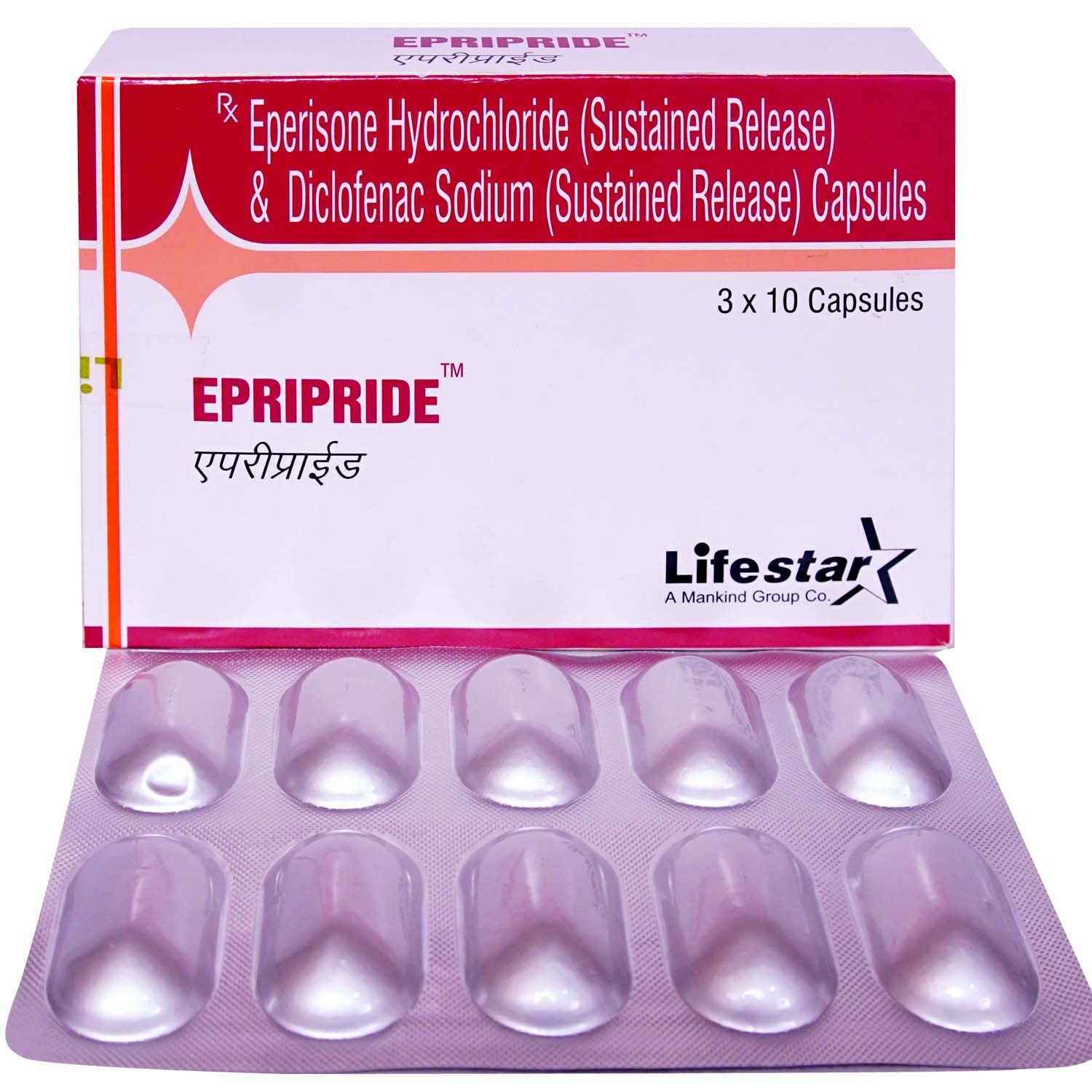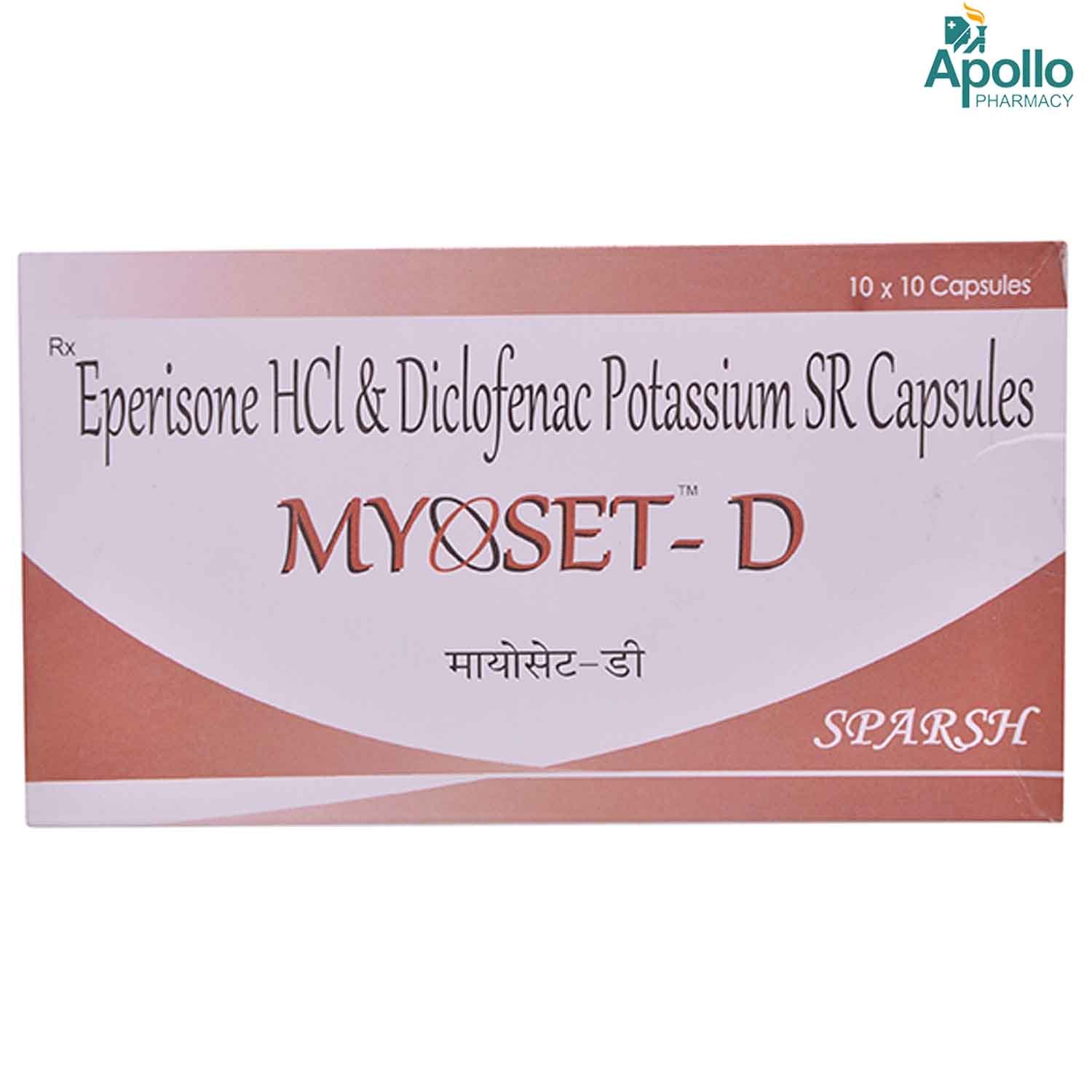Rapisone DSR Capsule 5's


₹163.2
MRP ₹217.525% off
(Inclusive of all Taxes)
Get Free delivery (₹99)
Know Your Delivery Time
Provide Delivery Location

Secure Payment

India's Most Trusted Pharmacy

Genuine Products
Composition :
Manufacturer/Marketer :
Consume Type :
Return Policy :
Expires on or after :
About Rapisone DSR Capsule
Rapisone DSR Capsule belongs to the class of ‘analgesics’ used in treating acute musculoskeletal (bone, muscles, or ligaments) spasms associated with low back pain. Low back pain, also called lumbago, is a condition that affects the lower portion of the spine. It often occurs due to injury, strain, or sprain in the muscles, bones, or ligaments present in the lower back. In most cases, the only symptom of this condition is a pain in the lower back.
Rapisone DSR Capsule contains Eperisone and Diclofenac. Eperisone is an antispasmodic. It works by relaxing skeletal muscles and reducing myotonia (inability of muscles to relax). It can relax vascular smooth muscles (present in the blood vessels wall) to improve blood circulation. It can also suppress pain reflex. Diclofenac is a nonsteroidal anti-inflammatory drug (NSAID). It works by reducing prostaglandins' production (chemical substances that cause pain and inflammation) at the affected site (muscle) and reduce pain.
You should use this medicine exactly as prescribed by the doctor. The common side-effects of Rapisone DSR Capsule are nausea, vomiting, stomach pain, heartburn, diarrhoea, indigestion, flatulence (gas), loss of appetite, headache, weakness, drowsiness, dizziness, and skin rash or spots. These side-effects are usually mild and temporary. However, if any of these side-effects persist or get worse, inform your doctor immediately.
It is not recommended to take Rapisone DSR Capsule if you are allergic to any contents of it. Before taking Rapisone DSR Capsule, inform your doctor if you have bleeding or ulcer in the stomach, history of stomach or bowel problems with NSAIDs, severe liver, kidney, heart failure, history of heart attack or stroke, and problems blood circulation. It is not recommended in children, pregnant women, and breastfeeding mothers. It should be used with caution in elderly patients. Avoid consumption of alcohol as it may increase the risk of side-effects. Rapisone DSR Capsule may cause dizziness or drowsiness, so do not drive or operate heavy machinery if you are not fully alert.
Uses of Rapisone DSR Capsule
Rapisone DSR Capsule is used in the treatment of Low back pain. The detailed uses of Rapisone DSR Capsule are as follows:
- Relief from Pain Due to Muscle Spasm: Rapisone DSR Capsule is primarily used to treat pain and discomfort caused by muscle spasms, strains, or sprains. It combines anti-inflammatory and muscle-relaxing properties to enhance mobility and alleviate stiffness.
- Comprehensive Musculoskeletal Support: Rapisone DSR Capsule works by relaxing skeletal muscles (via Eperisone) and reducing inflammation and pain (via Diclofenac). This combination mechanism helps restore normal muscle function. It provides faster recovery from musculoskeletal injuries.
- Management of Acute Muscular Conditions: Rapisone DSR Capsule contains Eperisone (a central muscle relaxant) and Diclofenac (a non-steroidal anti-inflammatory drug). Together, they relieve pain, reduce swelling, and improve muscle function in conditions such as back pain, neck stiffness, and post-injury muscle tension.

Have a query?
- Inform your doctor about the nausea and discuss possible alternatives to the medication or adjustments to the dosage.
- Divide your daily food intake into smaller, more frequent meals to reduce nausea.
- Opt for bland, easily digestible foods like crackers, toast, plain rice, bananas, and applesauce.
- Avoid certain foods that can trigger nausea, such as fatty, greasy, spicy, and smelly foods.
- Drink plenty of fluids, such as water, clear broth, or electrolyte-rich beverages like coconut water or sports drinks.
- Use ginger (tea, ale, or candies) to help relieve nausea.
- Get adequate rest and also avoid strenuous activities that can worsen nausea.
- Talk to your doctor about taking anti-nausea medication if your nausea is severe.
- Record when your nausea occurs, what triggers it, and what provides relief to help you identify patterns and manage your symptoms more effectively.
- Inform your doctor about your constipation symptoms. They may adjust your medication or advise alternative treatments.
- Stay hydrated by drinking sufficient of water (at least 8-10 glasses a day) to help soften stool and promote bowel movements.
- Increase fibre intake by eating foods high in fibre, such as fruits, whole grains, vegetables and legumes, to help bulk up the stool.
- Establish a bowel routine by trying to go to the bathroom at the same time each day to train your bowels.
- Engaging in regular exercise, like walking or yoga, can support in bowel movement stimulation.
- Consult your doctor if constipation persists, and discuss alternative treatments or adjustments to your medication.
- Report the itching to your doctor immediately; they may need to change your medication or dosage.
- Use a cool, damp cloth on the itchy area to help soothe and calm the skin, reducing itching and inflammation.
- Keep your skin hydrated and healthy with gentle, fragrance-free moisturizers.
- Try not to scratch, as this can worsen the itching and irritate your skin.
- If your doctor prescribes, you can take oral medications or apply topical creams or ointments to help relieve itching.
- Track your itching symptoms and follow your doctor's guidance to adjust your treatment plan if needed. If the itching persists, consult your doctor for further advice.
- Include iron-rich foods like dark leafy vegetables, lean red meat, legumes and fish in your diet.
- Consume vitamin C-rich foods as they aid iron absorption.
- Limit tea, cocoa, and coffee as these can slow iron absorption.
- Exercise regularly; however, do not overdo it.
- Tell your doctor about your GAS symptoms. They may change your medication regimen or prescribe additional drugs to help you manage them.
- To manage GAS symptoms, eat a balanced diet of fibre, vegetables, and fruits.
- Drink enough water throughout the day to avoid constipation and treat GAS symptoms.
- Regular exercise like yoga and walking may help stimulate digestion and alleviate GAS symptoms.
- Take probiotics only if your doctor advises, as they may help alleviate GAS symptoms by promoting gut health.
- Take medication for GAS symptoms only if your doctor advises, as certain medications can interact with your existing prescriptions or worsen symptoms.
- If symptoms persist, worsen, or are accompanied by severe abdominal pain, vomiting, or bleeding, seek immediate medical attention.
- Take medications with food (if recommended): It can help prevent stomach distress and indigestion.
- Eat smaller, more frequent meals: Divide daily food intake into smaller, more frequent meals to ease digestion.
- Avoid trigger foods: Identify and avoid foods that trigger indigestion, such as spicy, fatty, or acidic foods.
- Stay upright after eating: Sit or stand upright for at least 1-2 hours after eating to prevent stomach acid from flowing into the oesophagus.
- Avoid carbonated drinks: Avoid drinking carbonated beverages, such as soda or beer, which can worsen indigestion.
- Manage stress: To alleviate indigestion, engage in stress-reducing activities like deep breathing exercises or meditation.
- Consult a doctor if needed: If indigestion worsens or persists, consult a healthcare professional to adjust the medication regimen or explore alternative treatments.
- Inform Your Doctor: Notify your doctor immediately about your diarrhoea symptoms. This allows them to adjust your medication or provide guidance on managing side effects.
- Stay Hydrated: Drink plenty of fluids to replace lost water and electrolytes. Choose water, clear broth, and electrolyte-rich drinks. Avoid carbonated or caffeinated beverages to effectively rehydrate your body.
- Follow a Bland Diet: Eat easy-to-digest foods to help firm up your stool and settle your stomach. Try incorporating bananas, rice, applesauce, toast, plain crackers, and boiled vegetables into your diet.
- Avoid Trigger Foods: Steer clear of foods that can worsen diarrhoea, such as spicy, fatty, or greasy foods, high-fibre foods, and dairy products (especially if you're lactose intolerant).
- Practice Good Hygiene: Maintain good hygiene to prevent the spread of infection. To stay healthy, wash your hands frequently, clean and disinfect surfaces regularly, and avoid exchanging personal belongings with others.
- Take Anti-Diarrheal Medications: If your doctor advises, anti-diarrheal medications such as loperamide might help manage diarrhoea symptoms. Always follow your doctor's directions.
- Keep track of your diarrhoea symptoms. If they don't get better or worse or are accompanied by severe stomach pain, blood, or dehydration signs (like extreme thirst or dark urine), seek medical help.
Directions for Use
- Rapisone DSR Capsule can be taken with food or after a meal to minimize side effects such as stomach irritation.
- Follow your doctor’s instructions on the dosage and timing of this medication.
- Swallow Rapisone DSR Capsule as a whole with a glass of water.
- Do not crush, open, or chew it.
Key Benefits
Rapisone DSR Capsule is used to treat pain associated with muscle spasms that usually occur due to muscle strains, sprains, or injuries in the lower back. It contains eperisone and diclofenac. Eperisone is a muscle relaxant that shows an analgesic effect (relieve pain), whereas diclofenac can reduce pain, swelling, and inflammation in the muscles. It provides fast relief from pain, within a few hours after taking this medicine. It reduces muscle stiffness and enables the easy movement of the muscle. It is also well tolerated when taken at recommended doses. For the best results, rest and physical therapy are also essential along with this medicine.
How Rapisone DSR Capsule Works
Storage
What if I have taken an overdose of Rapisone DSR Capsule
Drug Warnings
Before taking Rapisone DSR Capsule, inform your doctor if you have any bowel disorders such as colitis (inflammation of the intestine), kidney or liver problems, porphyria (inherited blood disorder), bleeding disorders, asthma, seasonal allergies, long-term respiratory infections or illnesses, angina (chest pain), blood clots, high blood pressure, high cholesterol, diabetes, systemic lupus erythematosus (a skin disorder), smoking habit, and intolerance to some sugars. Rapisone DSR Capsule increases the risk of heart attack or stroke if high doses are used for prolonged periods. So, use it in the dose and duration as prescribed by the doctor. If you notice chest pain, breathing difficulties, weakness, or slurry speech, inform your doctor immediately as it can be a sign of problems with heart or blood vessels. Rapisone DSR Capsule is an anti-inflammatory and can mask the symptoms of an infection, so consult your doctor if you feel unwell.
Drug-Drug Interactions
Drug-Drug Interactions
Login/Sign Up
Co-administration of Rapisone DSR Capsule with Meloxicam can increase the risk or severity of gastrointestinal side effects.
How to manage the interaction:
Taking Meloxicam with Rapisone DSR Capsule is not recommended as it can possibly result in an interaction, it can be taken if your doctor has advised it. However, consult your doctor immediately if you experience symptoms such as dizziness, lightheadedness, red or black, tarry stools, coughing up or vomiting fresh or dried blood that looks like coffee grounds, severe headache, and weakness. Do not stop any medication without doctor's advise.
Taking Rapisone DSR Capsule with Enoxaparin can increase the risk of bleeding complications.
How to manage the interaction:
There may be a possible interaction between Rapisone DSR Capsule and Enoxaparin, but they can be taken together if your doctor has prescribed them. However, consult your doctor immediately if you experience any unusual bleeding or bruising, swelling, vomiting, blood in your urine or stools, headache, dizziness, or weakness. Do not discontinue any medications without consulting a doctor.
Taking Rapisone DSR Capsule with human immunoglobulin may increase the risk of kidney problems.
How to manage the interaction:
Although there is an interaction between Human immunoglobulin and Rapisone DSR Capsule, you can take these medicines together if prescribed by a doctor. However, consult the doctor immediately if you experience symptoms such as nausea, vomiting, loss of appetite, increased or decreased urination, sudden weight gain or weight loss, fluid retention, swelling, shortness of breath, muscle cramps, tiredness, weakness, dizziness, confusion, and irregular heart rhythm. Do not discontinue any medications without consulting a doctor.
Coadministration of Rapisone DSR Capsule with fondaparinux may increase the risk of bleeding.
How to manage the interaction:
There may be a possible interaction between Rapisone DSR Capsule and Fondaparinux when taken together, but they can be taken together if your doctor has prescribed them. However, if you experience bleeding, severe back pain, dizziness, black or red stools, severe headache, weakness, and vomiting contact your doctor immediately. Do not stop using any medications without first talking to your doctor.
Taking Rapisone DSR Capsule with Ibrutinib can increase the risk of bleeding tendencies.
How to manage the interaction:
There may be a possible interaction between Rapisone DSR Capsule and Ibrutinib, but they can be taken together if a doctor has prescribed them. However, consult a doctor immediately if you experience any unusual bleeding, dizziness, lightheadedness, red or black, tarry stools, coughing up or vomiting fresh or dried blood that looks like coffee grounds, or severe headaches. Do not discontinue any medications without consulting a doctor.
Co-administration of Rapisone DSR Capsule and Apixaban may raise the risk of stomach bleeding.
How to manage the interaction:
Although there is a interaction between Rapisone DSR Capsule and apixaban, but it can be taken if your doctor has advised it. Consult a doctor if you experience symptoms like blood in your urine or stool (or a black stool), severe bruising, prolonged nosebleeds, feeling dizzy or lightheaded, weakness or severe headache, vomiting blood or coughing up blood, heavy menstrual bleeding (in women), difficulty breathing, or chest pain. Do not discontinue any medication without consulting a doctor.
Taking Dasatinib together with Rapisone DSR Capsule may increase the risk of bleeding.
How to manage the interaction:
There may be a possible interaction between Rapisone DSR Capsule and Dasatinib but they can be taken together if a doctor has prescribed them. However, consult a doctor immediately if you experience dizziness, red or black, tarry stools, or severe headaches. Do not discontinue any medications without consulting a doctor.
Coadministration of Rapisone DSR Capsule with Ketoconazole may increase the risk of liver problems.
How to manage the interaction:
There may be a possible interaction between Rapisone DSR Capsule and Ketoconazole, but they can be taken together if a doctor has prescribed them. However, consult a doctor immediately if you have fever, chills, joint pain or swelling, unusual bleeding or bruising, skin rash, itching, loss of appetite, fatigue, nausea, vomiting, abdominal pain, dark colored urine, light colored stools, and/or yellowing of the skin or eyes. Do not discontinue any medications without consulting a doctor.
Concomitant administration of Rapisone DSR Capsule and furosemide may decrease the therapeutic efficacy of furosemide and adversely affect renal function.
How to manage the interaction:
There may be a possible interaction between Rapisone DSR Capsule and furosemide, but they can be taken together if your doctor has prescribed them. However, consult your doctor immediately if you experience symptoms like nausea, dizziness, irregular heartbeats, altered blood pressure, tingling. Do not stop using any medications without first talking to your doctor.
Co-administration of Rapisone DSR Capsule with Mipomersen may cause liver problems.
How to manage the interaction:
Co-administration of Rapisone DSR Capsule and Mipomersen can lead to an interaction, it can be taken if advised by your doctor. However, if you experience any symptoms like fever, chills, joint pain or swelling, unusual bleeding or bruising, skin rash, itching, loss of hunger, fatigue, nausea, vomiting, abdominal pain, dark urine, pale stools, and/or yellowing of the skin or eyes. Do not discontinue any medications without consulting a doctor.
Drug-Food Interactions
Drug-Food Interactions
Login/Sign Up
Diet & Lifestyle Advise
- Exercising regularly helps in muscle stretching so that they are less likely to spasm, tear, and sprain. Mild exercises such as jogging and walking are helpful for muscle stretching.
- Deep tissue massages with the help of muscle massager are considered helpful.
- Avoid wearing tight-fitting clothes, instead, wear loose garments.
- Rest well and get optimal sleep (at least 8 hours for adults).
- Hot or cold therapy can help treat muscle spasms.
- Apply an ice-pack or hot-pack on the muscle for 15-20 minutes.
- Try to include glycine (protein) in your daily diet, which is good food for your muscle.
Habit Forming
Therapeutic Class
RX
Epripride Capsule 10's
Mankind Pharma Pvt Ltd
₹121
(₹10.89 per unit)
66% CHEAPERRX
Eperifen Capsule 10's
Tas Med India Pvt Ltd
₹207
(₹18.63 per unit)
42% CHEAPERRX
Myoset D Capsule 10's
Sparsh Remedies Pvt Ltd
₹252
(₹22.18 per unit)
32% CHEAPER
Alcohol
Caution
Consumption of alcohol increases the risk of side-effects, such as liver damage and bleeding in the stomach.
Pregnancy
Unsafe
Rapisone DSR Capsule is usually not recommended during pregnancy, especially if you are more than six months pregnant as it may cause harmful effects to the unborn baby.
Breast Feeding
Unsafe
Rapisone DSR Capsule may pass into breastmilk and cause unwanted effects in the nursing baby. So, it is not prescribed in breastfeeding mothers. However, if prescribed, the doctor may advise you to stop breastfeeding while using this medicine.
Driving
Caution
Rapisone DSR Capsule may cause dizziness or drowsiness, so do not drive or operate heavy machinery if you are not fully alert.
Liver
Caution
Rapisone DSR Capsule causes liver damage, so it should be used with caution in patients with liver diseases. The dose may have to be adjusted by your doctor.
Kidney
Caution
Rapisone DSR Capsule should be used with caution in patients with kidney diseases. The dose may have to be adjusted by your doctor.
Children
Unsafe
Rapisone DSR Capsule is not recommended for children below 12 years of age.
FAQs
Rapisone DSR Capsule is used to treat musculoskeletal spasms associated with low back pain.
Rapisone DSR Capsule contains Eperisone and Diclofenac. Eperisone is an antispasmodic. It reduces muscle stiffness by relaxing the muscles and reducing pain by improving blood circulation and suppressing pain reflexes. Diclofenac is a nonsteroidal anti-inflammatory drug (NSAID). It works by reducing prostaglandins' production (chemical substances that cause pain and inflammation) at the affected site and reduce pain and swelling. Together, Rapisone DSR Capsule can effectively treat pain due to muscle spasms.
The common side-effects of Rapisone DSR Capsule are nausea, vomiting, stomach pain, heartburn, diarrhoea, indigestion, flatulence (gas), loss of appetite, headache, weakness, drowsiness, dizziness, and skin rash or spots. These side-effects are usually mild and temporary. However, if any of these side-effects persist or get worse, inform your doctor immediately.
Let your doctor know that you are taking Rapisone DSR Capsule before undergoing surgery of the stomach or intestine as Rapisone DSR Capsule can delay wound healing in some cases.
Rapisone DSR Capsule is probably safe and well-tolerated in diabetic patients when taken at recommended doses. However, higher doses or prolonged use may affect sugar levels and cause unwanted effects. So, let your doctor know that you have diabetes before taking Rapisone DSR Capsule.
It is recommended to take Rapisone DSR Capsule with food or after a meal to minimize side effects such as upset stomach or diarrhoea.
Country of origin
Manufacturer/Marketer address
Disclaimer
Author Details
We provide you with authentic, trustworthy and relevant information
Buy best C.n.s Drugs products by
Intas Pharmaceuticals Ltd
Sun Pharmaceutical Industries Ltd
Torrent Pharmaceuticals Ltd
Alkem Laboratories Ltd
Alteus Biogenics Pvt Ltd
Abbott India Ltd
Cipla Ltd
Micro Labs Ltd
Lupin Ltd
Tripada Healthcare Pvt Ltd
D D Pharmaceuticals Pvt Ltd
Ipca Laboratories Ltd
Arinna Lifesciences Ltd
Icon Life Sciences
Linux Laboratories Pvt Ltd
Mankind Pharma Pvt Ltd
Cnx Health Care Pvt Ltd
East West Pharma India Pvt Ltd
La Renon Healthcare Pvt Ltd
Eris Life Sciences Ltd
Emcure Pharmaceuticals Ltd
Leeford Healthcare Ltd
Talent India Pvt Ltd
Tas Med India Pvt Ltd
Consern Pharma Ltd
Macleods Pharmaceuticals Ltd
Zydus Healthcare Ltd
Jagsam Pharma
Troikaa Pharmaceuticals Ltd
Dr Reddy's Laboratories Ltd
Ikon Pharmaceuticals Pvt Ltd
Sigmund Promedica
Matias Healthcare Pvt Ltd
Aristo Pharmaceuticals Pvt Ltd
Ardent Life Sciences Pvt Ltd
Shine Pharmaceuticals Ltd
Zydus Cadila
Theo Pharma Pvt Ltd
Wockhardt Ltd
Propel Healthcare
Lifecare Neuro Products Ltd
Crescent Formulations Pvt Ltd
Reliance Formulation Pvt Ltd
Mesmer Pharmaceuticals
Matteo Health Care Pvt Ltd
Morepen Laboratories Ltd
Capital Pharma
Neon Laboratories Ltd
Ajanta Pharma Ltd
Med Manor Organics Pvt Ltd
Lyf Healthcare
Msn Laboratories Pvt Ltd
Sanix Formulation Pvt Ltd
Akumentis Healthcare Ltd
Brainwave Healthcare Pvt Ltd
Pulse Pharmaceuticals
Hetero Healthcare Pvt Ltd
Sanofi India Ltd
Solvate Laboratories Pvt Ltd
Cyrus Remedies Pvt Ltd
Elder Pharmaceuticals Ltd
Novartis India Ltd
Psyco Remedies Ltd
Medishri Healthcare Pvt Ltd
Alniche Life Sciences Pvt Ltd
Crescent Therapeutics Ltd
Hbc Life Sciences Pvt Ltd
Mova Pharmaceutical Pvt Ltd
Quince Lifesciences Pvt Ltd
Cadila Healthcare Ltd
Prevego Healthcare & Research Pvt Ltd
Tripada Lifecare Pvt Ltd
Alembic Pharmaceuticals Ltd
Talin Remedies Pvt Ltd
Kivi Labs Ltd
Serotonin Pharmaceuticals Llp
Solis Pharmaceuticals
Glenmark Pharmaceuticals Ltd
Infivis Life Care
Trion Pharma India Llp
A N Pharmacia Laboratories Pvt Ltd
Gagnant Healthcare Pvt Ltd
Primus Remedies Pvt Ltd
Crescent Pharmaceuticals
Glarizonto Pharma Pvt Ltd
Knoll Healthcare Pvt Ltd
Zuventus Healthcare Ltd
Arches Pharmaceuticals
Cadila Pharmaceuticals Ltd
Lia Life Sciences Pvt Ltd
Lyceum Life Sciences Pvt Ltd
USV Pvt Ltd
Vasu Organics Pvt Ltd
Wallace Pharmaceuticals Pvt Ltd
Corona Remedies Pvt Ltd
Glial Life Science Llp
Lincoln Pharmaceuticals Ltd
Maneesh Pharmaceuticals Ltd
Pfizer Ltd
Suraksha Pharma Pvt Ltd







